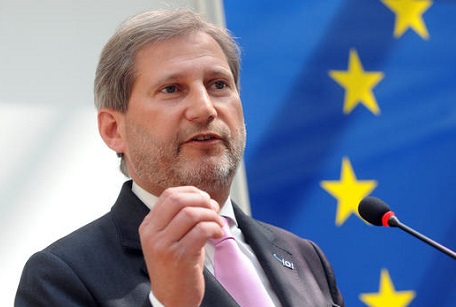EU top official Johannes Hahn: “Georgia made impressive efforts to implement AA deal”

European Union (EU) Commissioner for Neighbourhood Policy and Enlargement Negotiations Johannes Hahn believes Georgia has carried out "impressive reforms” to meet its obligations drafted within the EU-Georgia Association Agreement (AA) deal, signed in June 2014.
The EU top official made his statement yesterday during a debate in the European Parliament on how Georgia, Ukraine and Moldova were fulfilling the preconditions set through by the AA, which included the Deep and Comprehensive Free Trade Area (DCFTA).
The positive results for Georgia are already visible with strong growth in Foreign Direct Investments (FDI),” Hahn said.
Listen to Hahn’s notes below:
The Visa Liberalisation Action Plan has proven to be an effective tool for promoting a range of reforms, but Georgia has gone beyond the Action Plan benchmarks and taken further steps to reform the judiciary, as well as the Prosecutor’s Office,” the EU official said.
Following this lead, Hahn stressed the EU "was closely monitoring that the authorities make sure that there were no unlawful contacts against the Constitutional Court and its personnel.”
European Parliament member Andrejs Mamikins was also positive in his remarks and emphasised Georgia had made "unprecedented progress to integrate into the European space despite the current, large-scaled regional threats.”
The Member of Parliament (MP) also highlighted Georgia’s "deep, historical roots” as a European state and mentioned Georgia’s successful court reform.
Following the debate the European Parliament MPs drafted a resolution text regarding Georgia, Ukraine and Moldova, spoke of the progress already achieved by the three nations and voiced recommendations for the future.
The resolution text will be voted on later today.

European Parliament member Andrejs Mamikins stressed Georgia achieved success despite serious regional security threats. Photo by bbc.co.uk.
The document stated European Parliament welcomed the positive evaluation by the European Commission as regards for visa liberalisation for Ukraine and Georgia in the latest assessment of the implementation of the two countries’ Visa Liberalisation Action Plans. The text also expected the Council of Europe and the EU member states to proceed to grant the two countries a visa free travel regime without "undue delay”.
Meanwhile the recommendations for Georgia in the resolution draft noted concern about the potential use of the judicial system to fight against political opponents and called on all political forces to avoid this type of instrumentalisation.
This concern was mainly voiced by the European People’s Party (EPP). In response to such statements several European Parliament MPs said such concern might arise "with regard to all countries of the neighborhood and appealed to the EPP to show its support to Georgia’s European aspirations”.
The European Parliament MPs also called on the Georgian Government, especially in view of the 2016 Parliamentary Elections, to create a favourable environment for free media, which promoted freedom of expression and media pluralism, and to allow the media to report independently and objectively without political or economic pressure.
See the full text of the resolution here.
 Tweet
Tweet  Share
Share